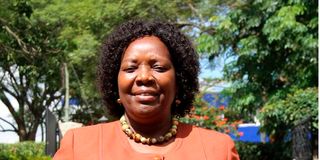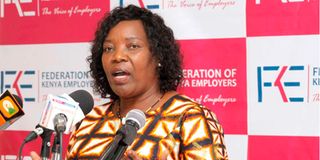FKE boss troubled by 'silent discrimination'

Federation of Kenya Employers CEO Jacqueline Mugo during the interview at her office in Nairobi on March 17, 2021.
What you need to know:
- Ms Jaqueline Mugo sits at the Federation of Kenya Employers (FKE) as the Executive Director.
- Sexual harassment is what she refers to silent discrimination and whose ending is even complicated by the fact that there lacks safe spaces to nip the problem.
- Nevertheless, she is walking the journey of finding innovative ways of putting a stop to the problem.
Ms Jaqueline Mugo is troubled.
She sits at the Federation of Kenya Employers (FKE) as the Executive Director. Considering her position, Ms Mugo is privy to the practice of labour relations in Kenyan-based firms across diverse sectors.
One thing troubles her the most about engagement of women in paid labour; silent discrimination.
Sexual harassment is what she refers to silent discrimination and whose ending is even complicated by the fact that there lacks safe spaces to nip the problem.
“Many cases of sexual harassment happen at the top management .Where do you go to report when the CEO is the perpetrator? “ she poses noting that the youth trying to rise through the ranks are at most risk of sexual harassment.
Nevertheless, she is walking the journey of finding innovative ways of putting a stop to the problem that makes it difficult for women to enter the job market and access equal employment opportunities.
How to create workable mechanisms to end the vice in the workplaces, she says, is a conversation that FKE continues to hold with its members and labour sector players.
On the other hand, she is raising the bar for women to join corporate leadership.
Since 2013, FKE has been running a Female Future Program in collaboration with Confederation of Norwegian Enterprise. The program seeks to redress gender gaps in corporate governance.
It constitutes of three modules. First, the leadership package under which the women drawn various sectors such as financial, media, manufacturing and hospitality among others, are tipped on management skills.
Public governance
Second, board competency module which prepares them to take over board leadership. Third, rhetoric component in which they are taught the art of persuasion in private and public governance.
Currently, the program which has benefitted 302 women, enrols only those in the middle-level management as they are at a vantage point to climbing up the management ladder, Ms Mugo says.
She says most of the women who have gone through the program have risen through the ranks in their respective organisations while others have exited to start new careers.
They, however, have to apply for the nine-month program, upon advertisement.
The program matches with the changing business environment as an increasing number of corporates in Africa are embracing the concept of gender diversity and inclusion.
Ms Mugo says in the past decade, the space for women in corporate leadership has gradually expanded. This is due to growing consciousness on the benefits of having proportionate representation of women and men in the decision making organs.
“The corporate world has over the last decade committed itself to responsible business practices; to opening spaces for women because they need them…but the reality is that the numbers are still low,” she says.
Of the result of the adoption of responsible business practices, she says, is a note of appeal in the advertisements placed by corporates encouraging women to specifically apply.
Competition for jobs
However, when it comes to career growth, women often find themselves between a rock and a hard place. Usually, deciding on whether to progress or start a family comes across as the hardest choice to make in a world where the competition for jobs and promotion is stiff.
The FKE chief poses: “Sometimes we make choices that inhibit our growth…but there are now many programs to build the capacity of women to enable them make informed career choices.”

Ms Jacqueline Mugo addressing the press on the survey findings on the impact of Covid- 19 on enterprises at Waajiri House in Nairobi in September, last year.
In the post-Covid-19 era, the space for women in the employment sector is shaky and uncertain, she indicates.
Studies already point to the reality that women above 55 years and who lost or quit their jobs during Covid-19 period may never get to be rehired if they lack digital skills, which have become a necessity to running businesses in the new normal.
But the worst is the fact that while the labour market has shrunk, the government is nonetheless creating a conducive environment for its recovery.
Introduction of new taxes such as minimum tax and fuel levy hike, she notes, disincentivise the labour industry, thereby strangling opportunities for business expansion.
Limping businesses
FKE’s latest survey indicate the pandemic to have decimated all jobs created in the formal sector. Additionally, businesses are limping and it’s impossible to tell when they are likely to start walking.
Ms Mugo says: “For you to keep people in jobs, you have to be operating profitably and that is not happening. It is important for us as a country to look at how we can reduce the cost of doing business. Could we look at how to finance the Big for Agenda without increasing taxes?”
Just like last year, there will be more job losses in 2021 as businesses restructure to remain afloat, she says.
Ms Mugo who was born in Eldoret and brought up in Kericho and Nairobi counties, says it is possible for a woman to rise from a traumatic experience and become a phenomenal figure in the development space.
Her father passed on when she was about to start school. She had to wait for two more years before she could enrol for pre-primary. At the time of his death, her mother was a stay-at-home wife. She had to relocate to Nairobi to find work to raise her seven children - two of whom have since died.
“My mother is an example of resilience. She was married at the age of 16 and widowed before she was 30. If she could rise through that and educate us to university level, then for sure one can make it in life,” she concludes.





